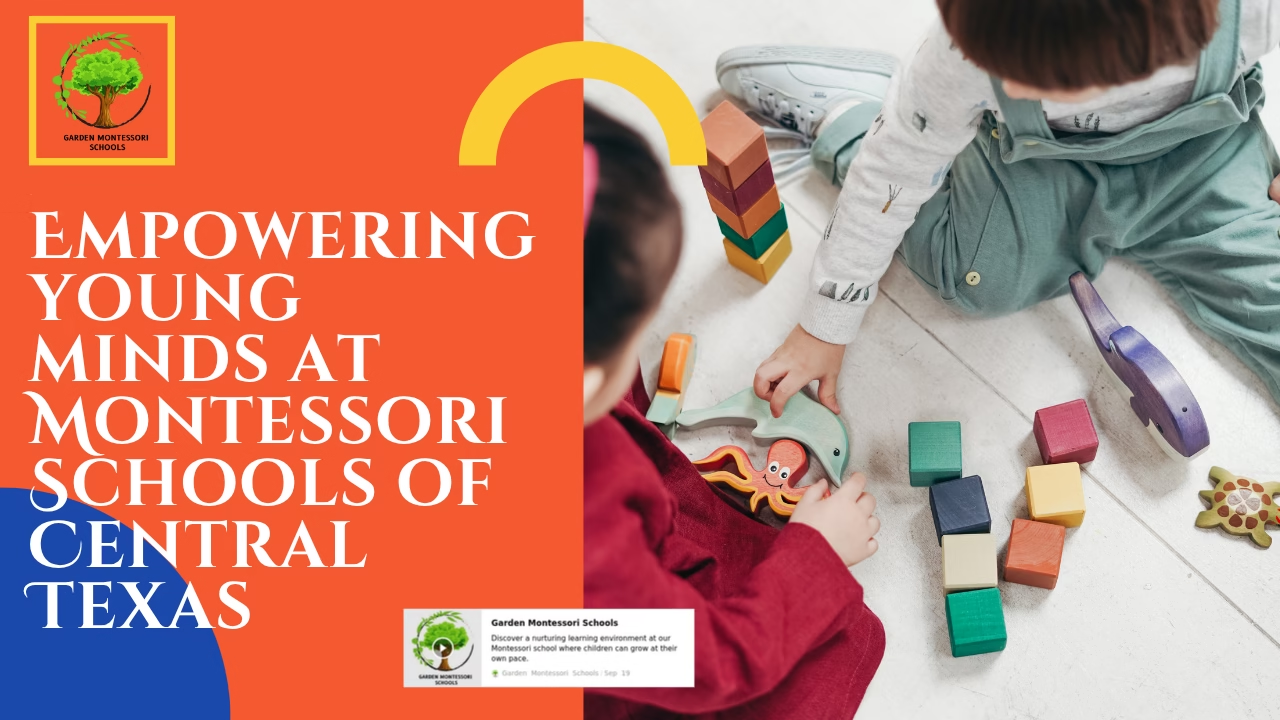Learning through gardens encourages young children to develop emotionally, socially, and physically through appreciation for nature. In our opinion at Garden Montessori, a garden is an educational space, a curriculum in itself that embodies creativity, self-reliance, and collaboration.
In this post, we investigate how a Montessori garden impacts child development and how it focuses on children’s learning. In what sense is a Montessori school garden helpful and why is it important for children’s access to nature through the framework of a natures curriculum and the principles of Montessori education?
Why Is It Important for Children to Have a Montessori Garden?
A Montessori garden provides children with an opportunity to learn and practice responsibility, teamwork, and nurture. This is more than simply relying on textbooks; it’s about using different senses and developing intellectually.
As they care for the plants, children learn about the life cycles of living things, learn patience, and practice delayed gratification which is essential for emotional growth. Garden activities also develop the gross motor muscles as children are involved in digging, watering, and attending to various plants.
This approach fits very well with the children’s education philosophy at Montessori, which is based on children learning through doing. In this way, the Montessori garden helps in developing independence, self-esteem, and compassion which are the main focus of values at Garden Montessori Schools.
How Does the Montessori Garden Create Awareness Towards the Environment?
At Montessori, one of the major principles is that children should respect and understand nature, which can be facilitated through the use of a garden. Children have a positive attitude towards the environment because they are taught about ecosystems, plants, and sustainable practices.
These lessons instill children with the knowledge that they are caretakers of the Earth and such knowledge nurtures a love for nature. At Garden Montessori Schools, we have a garden program that emphasizes composting, recycling, and conservation.
Children conceptualize how every action has consequences and this understanding is very important if they are to be responsible citizens in an environmental context in the future. The Montessori garden, through hands-on activities, teaches respect for the Earth, which also is one of The Advantages of Montessori Education.
What Are the Benefits of Gardening for Children’s Socio-Emotional Development?
Gardening is a form of therapy, and children take pleasure in caring for living things, which enhances self-image and provides a tool for emotional regulation. It offers children some calming and stress-free outlet, which is paramount in controlling one’s feelings.
They develop a sense of purpose and commitment, and through the successful nurturing of plants, confidence, and emotional stability is achieved. Another benefit of gardening is that it teaches children patience, gentleness, and observational skills since different plants need to be nurtured in proper ways.
At Garden Montessori Schools, we appreciate the fact that a Montessori garden allows for gradual socio-emotional development which helps the child cope with stressors in life.
In What Ways Do the Social Skills of Children Increase in the Montessori Garden Environment?
Montessori gardens are homes to multiple types of collaboration as children engage in projects, divide up the tools needed, and work towards reaching a goal.
This environment is the perfect place to learn social skills because children understand the value of working together, cooperating, and respecting other people’s work.
Through joint efforts to plant, water, and harvest, children at Garden Montessori Schools remember basic courtesies as well as the communication that is required with other people.
Such interactions create bonds with others, build leadership skills, and create a healthy class environment, and these are some of the Benefits of Montessori Education.
Why Are Gardens Important for Sensory Development in Montessori Education?
Sensory experiences occupy an important place in a child’s life, and looking at the work Montessori has organized, it is clear that there are a lot of gardens in this educational system.
Children play in the dirt, look up at flowers in various colors, hear the wind rustling through the leaves, and wiggle their fingers in the soil. Engaging in such activities helps them develop the means to process through their senses and cognitive abilities.
At Garden Montessori Schools, we incorporate gardening tasks that encourage fine motor skill development and hand-eye coordination as children engage with trees and plants that help them enhance their sensory integration.
This hands-on experience with natural components facilitates learning and comprehension of the environment for children, thereby promoting the Benefits of Montessori Education.
What are the effects of gardening on the development of fine and gross motor skills?
Gardening tasks such as seed planting, plant care, and watering all engage various motions that contribute to one’s overall gross and fine motor skills.
Other more intricate activities such as pruning, seed dispersal, or tool work incorporate movements of a more precise nature to achieve better control of one’s body. Such movements help to build muscles and increase the overall level of dexterity.
At Garden Montessori Schools, our Montessori garden promotes gross and fine motor development and mastery of these abilities is a part of a child’s development. Such activities nurture confidence and improvement of motor control which is critical for early childhood development.
Why Is a Montessori Garden the Best Place for Children to Learn to be Patient and Responsible?
It’s easy for children to be impatient when doing certain tasks or chores as they tend to look for instant results. Gardening is not one of those tasks and is an excellent way of teaching children.
Patience is about waiting, focusing on how things can take time to bear fruit, just as when one is waiting for a garden to grow. One tactic that is consistent with the Mission of Garden Montessori Schools is that children have roles in the garden, thereby fostering a sense of caretaking and ownership of the area.
The fact that they take care of the place instills in them the beauty of building responsibility and maturity.
How Does the Montessori Garden Help in the Development of One’s Curiosity and Scientific Mind?
Gardening in itself contributes to many unanswered questions such as how do plants grow? What kind of soil works? What do you need to grow certain plants and how do the weather and insects play a role?
This curious instinct is ideal for children’s holistic development as it helps them build problem-solving strategies and develop a scientist-like passion for explorations.
The programs offered in Garden Montessori Schools follow the converse as children engage in the fascinating role of exploration in an all-inclusive Montessori garden. This type of learning makes for an exciting time in class, as students get to actively interact with science and not just read about it.
Why Does the Activity of Gardening Bring about an Increased Sensitivity Towards Nutrition in Young Children?
A well-maintained Montessori garden can help respond to the needs of young children in relation to their help-seeking behavior or the need to eat healthy food through engagement in growing their vegetables and fruits.
When kids are involved with food production, they tend to be more willing and able to consume it and appreciate its taste, which creates effective exposure to nutrition matters. Hence, at Garden Montessori Schools, we emphasize health and well-being by teaching kids about sources of food as well as the importance of a balanced diet.
Such practice is helpful as it teaches children to select appropriate food for their health hence it is an essential life skill and well highlights the benefits of Montessori education.
How Does Working with Plants Outdoors in the Montessori Setting Fit into the Environment?
At Garden Montessori Schools, gardening is thus a part of the curriculum and is an extension of normal learning. It promotes specific principles such as interdependence, nurturance, and inherent inquisitiveness.
Our garden programs at Garden Montessori Schools have been developed with these principles in mind, allowing children to be independent, explore and nurture at their own pace.
This focus allows for a more holistic learning experience in all areas of the development of a child and in doing so allows the garden to become a crucial part of the Montessori experience.
Conclusion:
The Montessori garden at Garden Montessori Schools, just like any other Montessori school, rests at the core of the Montessori philosophy focusing on the overall development of a child.
Children can cultivate their gardens and this enables them to engage in activities that encompass the mind, body, and emotions. Whether it’s about taking care of the environment or learning how to be patient and cooperate, the zeal for acquiring new knowledge is heightened by the gardens which hone different skills all aimed at encouraging young minds.
Each interaction within the garden has the advantages of Montessori education since the children understand and assimilate academic concepts as well as life skills lessons. All these experiences are rooted in nature, a nurturing, rich, empowering environment makes an impression on each child’s development consistent with the Montessori philosophy.
FAQs For Montessori Garden:
Benefits of a Montessori garden for children, what are they?
A Montessori garden helps children take on responsibility, be patient, have an appreciation for the environment, and learn more while at the Garden Montessori Schools.
Building upon the previous questions, how does gardening relate to the education principle of Montessori?
Gardening is in accordance with the Montessori principles as it encourages hands-on, experiential learning, a pedagogical approach that is particularly emphasized at Garden Montessori Schools.
What skills do children acquire with gardening experience at a Montessori garden?
Children develop gross and fine motor as well as social skills at the Garden of Garden Montessori Schools.
It can be said that sensory development must be considered too, when looking at a Montessori garden. How does this happen?
Education at Garden Montessori Schools is built on the understanding that a Multimedia Garden helps refine sensory abilities through direct interaction with nature.
What benefits of education in the Montessori system will be useful for children at a young age?
Education in Montessori gives children the opportunity to be autonomous, inquisitive, and learn through doing, underlying principles we wish to develop at Garden Montessori Schools.



